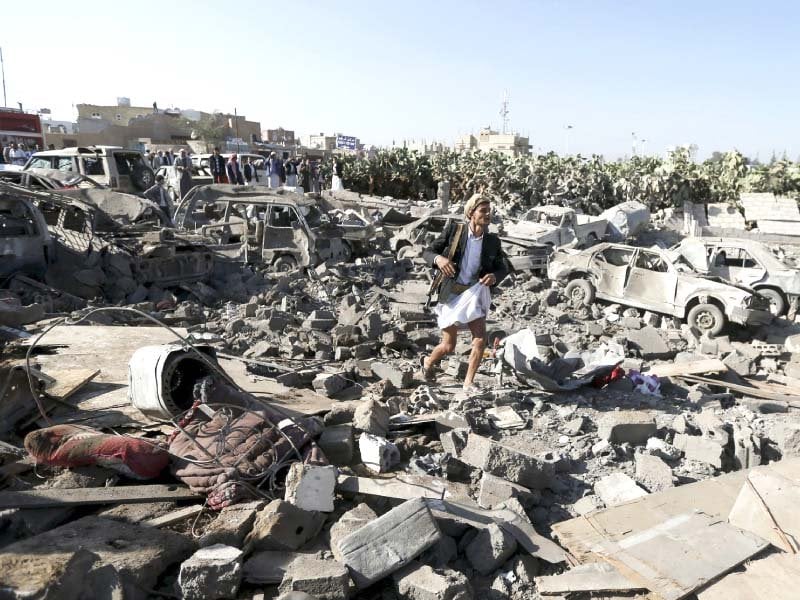
Pakistan on Thursday dropped a broad hint that it is ready to join the Saudi-led military alliance of Gulf states against Houthi rebels in Yemen – in a controversial move that analysts say will have massive repercussions for both the country and the world at large.
Hours after Saudi Arabia sought Pakistan’s help, a high-level huddle at the Prime Minister’s Office on Thursday concluded that “any threat to Saudi Arabia’s territorial integrity will evoke a strong response from Pakistan.”
“Pakistan enjoys close and brotherly relations with Saudi Arabia and other Gulf Cooperation Council (GCC) states and attaches great importance to their security,” an official statement quoted Prime Minister Nawaz Sharif as saying.
“It was, therefore, decided that on March 27, 2015 (today) a delegation comprising the federal minister for defence and the adviser to the prime minister on national security will visit Saudi Arabia to assess the situation. Senior representatives from the armed forces will also accompany the delegation,” the statement added.
The crucial meeting presided over by Prime Minister Nawaz Sharif was attended by Chief of Army Staff General Raheel Sharif, Air Chief Marshal Sohail Khan as well as Defence Minister Khawaja Asif and Prime Minister’s Adviser on National Security and Foreign Affairs Sartaj Aziz.
The high-level consultations came hours after Saudi Crown Prince Muqrin bin Abdulaziz telephoned Premier Nawaz, seeking the country’s help against Houthi rebels in Yemen.
The official Saudi Press Agency (SPA) also claimed on Thursday that five Muslim countries, which include Pakistan and Egypt, want to participate in the military coalition against Houthi rebels who have seized large swathes of territory in Yemen. Together with Jordan, Morocco and Sudan, they have “expressed the desire to participate in the operation” against the rebels, which the kingdom has dubbed ‘Firmness Storm’, the state-run news agency said.

At her weekly briefing on Thursday, Pakistan’s Foreign Office spokesperson Tasnim Aslam confirmed that Pakistan was examining the Saudi request on the Yemen issue. However, she did not provide details regarding the nature of assistance Riyadh was seeking from Islamabad.
A senior official told The Express Tribune that the Pakistani delegation visiting Saudi Arabia will work out details as to how Islamabad could provide assistance in the current security environment.
The official, who spoke on the condition of anonymity because of the sensitivity of the issue, said Pakistan might send troops to Saudi Arabia if its ‘territorial integrity’ comes under threat due to civil war in neighbouring Yemen.
“However, there is no decision yet whether Pakistan will send troops inside Yemen to fight against the rebels,” the official added.
Another official familiar with the development disclosed that Saudi Arabia was also seeking assistance from the Pakistan Air Force to target hideouts of Houthi rebels in Yemen, and from Pakistan Navy for logistical support.
The official pointed out that a final decision regarding the nature of assistance would be taken after the visit of high-level delegation to Riyadh. He said given the sensitivity of the issue, the government may also consult all major political parties before arriving at a final decision on the Saudi request.
But the likely decision to join military alliance led by Gulf countries may have a fallout for Pakistan’s relations with neighbouring Iran.
Iran condemned Saudi Arabia on Thursday for launching air strikes on Houthi rebels in Yemen, saying it was ‘a dangerous step’ that violated “international responsibilities and national sovereignty.” Iraqi authorities also voiced concern over the strike.
“This aggression will have no result except to spread terrorism and extremism, and increase insecurity throughout the region,” said Iran’s foreign ministry spokesperson Marzieh Afkham, calling for an immediate halt to the air strikes.
Defence Minister Khawja Asif made it clear that the federal government would not take any decision that might affect Pakistan’s relations with Iran.
The head of the Senate Standing Committee Senator Mushahid Hussain Syed warned that any move by Pakistan to ‘embroil’ itself in the Middle East affairs would have dangerous consequences for the country.
“Knowing the Pakistani leadership, both khaki and mufti, I would be very surprised if they decide to get entangled in the Yemeni civil war, when they are already so preoccupied with fighting terrorism at home.,” Mushahid commented.
Calling such an act a “recipe for disaster and destabilisation” of Pakistan, he said the government should focus on setting ‘our own house in order first’ rather than getting embroiled in Middle East “proxy wars”.
He said “sinking into the Yemeni quicksand” would be worse than the Afghan quagmire of the 1980s, whose consequences Pakistan is still trying to come to terms with.
Yemen ports shuts down
Yemen shut its major seaports on Thursday, industry and local sources said, after neighbouring Saudi Arabia and Arab allies launched air strikes against Houthi forces fighting Yemen’s president. In the south, Houthis and army loyalists battled with militiamen loyal to President Abd-Rabbu Mansour Hadi near the port city of Aden. “All major seaports were shut down on Thursday due to the rising conflict,” said an industry source. Local sources in Yemen confirmed the closure.
‘No ground operation planned’
Saudi Arabia has no immediate plans to launch ground operations inside Yemen but its forces and those of its allies are ready to do so if needed, the military spokesman of the operation said on Thursday. “There are no plans at this stage for ground forces operations, but if the need arises, the Saudi ground forces and those of the friends and sisterly forces are ready and will repel any aggression,” Brigadier General Ahmed Asseri told a news conference.
(With additional input by news wires
Published in The Express Tribune, March 27th, 2015.



1732105641-0/BeFunky-collage-(78)1732105641-0-165x106.webp)


1726722687-0/Express-Tribune-Web-(9)1726722687-0-270x192.webp)


1732096230-0/BeFunk_§_]__-(12)1732096230-0.jpg)







COMMENTS (2)
Comments are moderated and generally will be posted if they are on-topic and not abusive.
For more information, please see our Comments FAQ